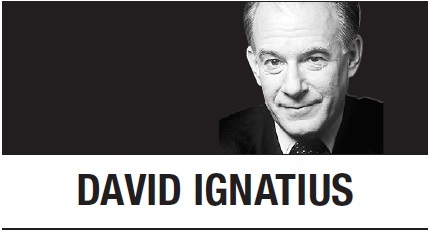[David Ignatius] Trump’s dangerous intelligence shakeup
By David IgnatiusPublished : Aug. 1, 2019 - 17:05
 Among intelligence professionals, President Donald Trump’s nomination of an inexperienced, partisan politician to oversee America’s spy agencies prompted deep dismay -- but also a stolid reaffirmation of the spymaster’s credo: Let’s get on with it.
Among intelligence professionals, President Donald Trump’s nomination of an inexperienced, partisan politician to oversee America’s spy agencies prompted deep dismay -- but also a stolid reaffirmation of the spymaster’s credo: Let’s get on with it. This combination of incredulity and stoicism was voiced by a half-dozen current and former officers I spoke with Monday about Trump’s choice of Rep. John Ratcliffe, R-Texas, to become director of national intelligence. The worry is partly that Ratcliffe lacks any real experience, and perhaps more that he has embraced Trump’s “deep state” conspiracy theories about the CIA and FBI.
“This makes the workforce wonder, what are we doing here?” said one veteran CIA station chief. But a few moments later he affirmed: “This place is under siege. People say, carry on, protect the mission, avoid the firing range.”
“Analysts will be asking how well (Ratcliffe) will represent our product downtown,” said a second former officer who served in a senior position under Dan Coats, the departing DNI. This former official predicted that it would take Ratcliffe a year just to understand the vast array of 17 intelligence agencies he will oversee, if he’s confirmed.
The deepest worry among intelligence professionals is how the Ratcliffe nomination, and the intense partisanship that fueled it, will be perceived by America’s intelligence partners overseas. “They’re in wait-and-see mode,” said a former senior CIA officer after canvassing a group of intelligence colleagues.
If the White House exerts political control through Ratcliffe, “foreign governments will be wondering if they should be sharing information” with the CIA and NSA, said the veteran station chief.
The most successful DNI since the creation of the post in 2004 was Coats’ predecessor, James Clapper, a career intelligence officer whom Trump recklessly attacked because of his supposed political bias. In fact, Clapper was the model of an independent intelligence chief, who told the truth about intelligence failures in assessing the Islamic State, for example, when it made colleagues in the Obama administration uncomfortable.
Coats showed similar willingness to give honest if politically awkward assessments in congressional testimony in January of North Korea’s continuing nuclear weapons development and Iran’s continuing compliance with the 2015 nuclear deal -- both contradicting Trump’s line.
This truth-telling standard is in the DNI’s job description. Trump instead chose “a man who tells the president what he wants to know, rather than what he needs to know,” said the veteran station chief.
A decisive factor in how the intelligence community views Ratcliffe will be his treatment of his two most senior prospective lieutenants: Gina Haspel, the CIA director; and Sue Gordon, who has been Coats’ deputy.
Haspel benefits from having a solid relationship with Secretary of State Mike Pompeo, who preceded her as CIA director. Pompeo is probably Trump’s most influential adviser, and his patronage will shield Haspel, if it continues. Foreign spy services, too, are hoping that Pompeo can protect Haspel, but they will begin hedging their bets if she’s isolated.
“If Gina gets cut out, the liaison services will begin to shut everything down,” said the former CIA officer who had talked with colleagues. Similarly, CIA employees will ask, “What the hell am I here for?” said this former case officer.
The future role of Gordon, a 39-year veteran of the intelligence community, will be especially important. She would normally become acting DNI with Coats’ departure, but Trump signaled that he planned to announce a new acting director. The DNI’s lawyers have concluded that Trump has that power, legally, but it wasn’t clear Monday who would take the post, and the situation appeared to be fluid.
Gordon is widely admired within the inbred, sometimes back-biting world of intelligence. She served in all four of the CIA’s directorates -- operations, analysis, support, and science and technology. She helped launch the agency’s in-house technology incubator, known as “In-Q-Tel,” and ran the agency’s hi-tech information operations center. If Gordon leaves, Ratcliffe’s problems will multiply.
Because Ratcliffe is such a partisan and inexperienced nominee, his confirmation hearings will be a crucial baseline. A former top-level CIA official said he should be quizzed: “If analysts say Kim Jong-un won’t give up his nuclear weapons, would you so testify? If the analysts say Iran is complying with the nuclear agreement, would you so testify?”
Trump is governing these days with the destructive power of a sledgehammer. The intelligence shakeup could be his most dangerous move yet. If Ratcliffe doesn’t promise to strictly safeguard the intelligence community’s independence, his nomination should be tossed. This one really matters.
David Ignatius
David Ignatius can be reached via Twitter: @IgnatiusPost -- Ed.
(Washington Post Writers Group)



















![[Today’s K-pop] BTS pop-up event to come to Seoul](http://res.heraldm.com/phpwas/restmb_idxmake.php?idx=642&simg=/content/image/2024/04/17/20240417050734_0.jpg&u=)